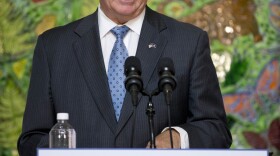
Elana Gordon
Elana Gordon covers the health beat at KCUR. She was previously a production assistant for KCURâ
-
After initially declining federal funding to expand Medicaid, Gov. Tom Corbett has changed course slightly. He is pursuing an approach for Pennsylvania that would make use of federal funds, but there are some caveats.
-
Secure data storage is a big selling point for Cerner. But the company also develops software for all kinds of medical settings, and it even sends tech people to hospitals to run their information systems. Founded in 1979, Cerner now employs 12,000 people, and it can't hire engineers fast enough.
-
A competition to encourage entrepreneurs to design health apps came up with a wide range of possibilities. One app audits medical bills for errors and savings. Another helps find prices for services, such as dental exams, for people without insurance coverage.
-
The presence of fast food joints on hospital campuses often conflicts with wellness efforts. Long-term leases have made it difficult for these facilities to kick the restaurants out. But some hospitals are managing to give burgers and fries the boot.
-
Immediately after last week's election, Missouri Gov. Jay Nixon announced the state would not be setting up its own health insurance exchange. Next door in Kansas, Gov. Sam Brownback announced that Kansas will have no involvement in running a state exchange either. The moves open the door for increased federal involvement in health care in staunchly Republican territory.
-
A surprising number of hospitals continue to host major fast-food restaurants on their premises. In Kansas City, Truman Medical Center is trying to compete with McDonalds' by serving healthier food. In the past, hospitals have been slammed for offering not so healthy choices.
-
The law's expansion of coverage puts free clinics in uncharted territory. Their dilemma: Should they stay outside the mainstream of the health system, remaining mostly dependent on donations and grants? Or should they start to accept Medicaid and other insurance?






